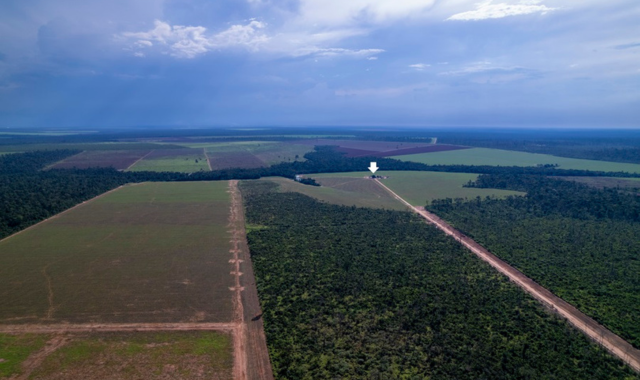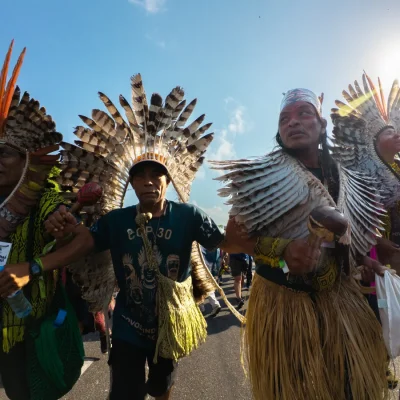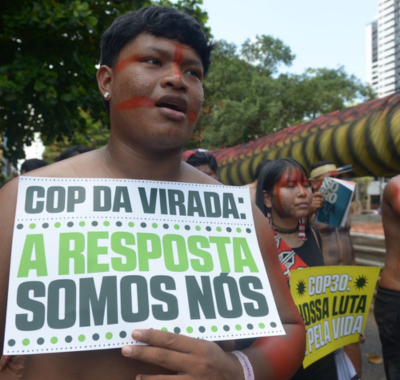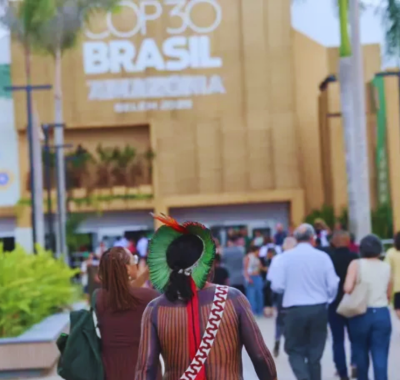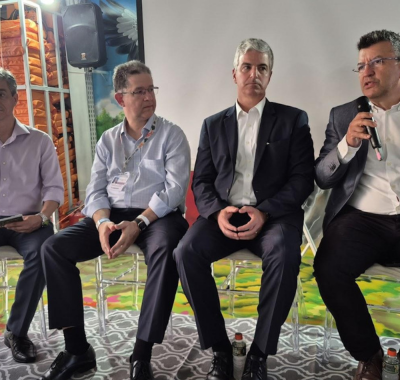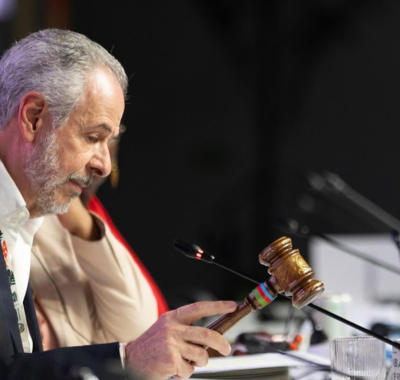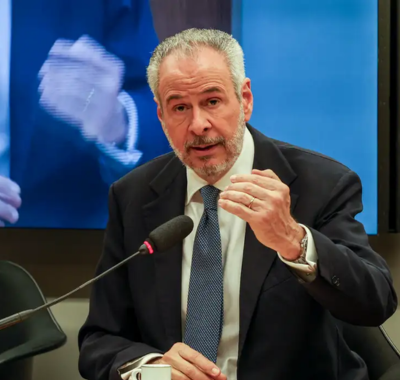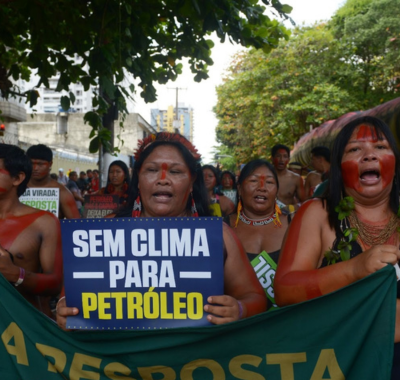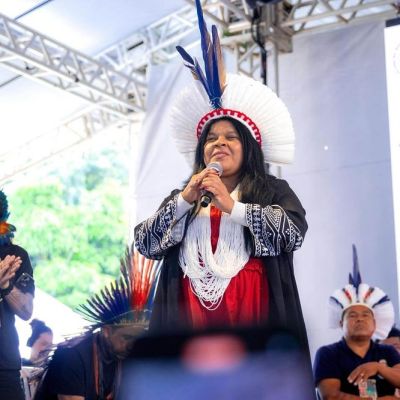COP30: Biofuel industries advocate changes to the Soy Moratorium, a pact against Amazon deforestation
Signed by environmentalists and businesses, the moratorium is seen as one of the main factors for reducing deforestation in municipalities with grain plantations in the Amazon. The debate on biofuels takes place at a time when Brazil is trying to be a global leader on the subject.
By Daniel Camargos
Translation: Roberto Cataldo/Verso Tradutores
FROM BELÉM, Pará – André Nassar is the executive president of the Brazilian Association of Vegetable Oil Industries (ABIOVE), an organization representing the country’s largest grain processors. He says that companies do not want to “break with the soy moratorium,” but he advocates “some kind of improvement” in the agreement that bans sourcing from areas deforested after July 2008 in the Amazon.
The statement was given to Repórter Brasil after he participated in a panel on Saturday (15) during COP30, in Belém, Pará. The event discussed biofuel production in Brazil. Today, seven out of ten liters of diesel manufactured from agricultural raw materials come from soybeans.
Environmental organizations claim that changes to the agreement could weaken the fight against deforestation and advocate keeping the current rules. To date, no concrete proposal has been presented to change them.
Signed by private companies, NGOs, and public authorities, the moratorium is considered one of the main instruments for preserving the Amazon biome, having contributed to a 69% reduction in clearing of native forests by 2022, according to estimates by the Soy Working Group (GTS), which includes environmental organizations, the federal government, businesses, and associations such as ABIOVE itself.
Rural producers critical of the agreement want to plant soy in areas deforested after 2008, which cannot supply signatory companies, according to the rules of the agreement.
Currently, the business pact is under evaluation by Brazil’s Administrative Council for Economic Defense (CADE) and the Supreme Federal Court (STF).
Supreme Court Justice Flávio Dino ordered the suspension of all legal and administrative actions that discuss the validity of the moratorium and its compatibility with competition rules. The injunction seeks to avoid conflicting decisions and establish a “safe legal framework” for agribusinesses in a scenario of billion-dollar disputes.
The president of ABIOVE says that the industry has been committed to the pact for almost 20 years. According to Nassar, rural producer associations have been pressuring companies to be paid compensation for areas that have ceased to be cultivated due to the moratorium, which he sees as “absurd.”
Asked if increasing soybean production to meet the higher demand for biofuels could increase pressure on the forests, he disagreed. “I don’t agree with the argument that more biodiesel results in more soybean-planted area. Expansion of plantations is driven much more by exports of soybeans as grains. It’s the demand for food, not the demand for energy,” he argued.
Biofuel offensive involves “producing” science, executive says
In his presentation at the COP30 panel, Nassar stated that the soybean oil industry needs to “produce science to work on all the communication aspects.” Addressed to an audience dominated by industry representatives, the sentence was used to advocate agricultural biofuels at a time when the sector is under criticism.
Nassar stated that, after the UN climate conference, “the whole world will zoom in on Brazil” to discuss agricultural biofuels and question two points: competition with food production and deforestation associated with supply chains. “We are ready for that,” he said.
The optimistic statements contrast with the scenario that social organizations and researchers have been documenting on the ground. Far from the controlled environment of the COP30 negotiation zone, the supply chains that underpin ethanol, biodiesel, and SAF (sustainable aviation fuel) have been associated with territorial conflicts, deforestation, and labor violations.
The debate on biofuels at the climate summit is taking place at a time when the Brazilian government is trying to make the country a global leader on the agenda. In Brasília, President Lula presented the Belém 4X Commitment – an international declaration sponsored by Brazil, Italy, and Japan that proposes quadrupling the global use of sustainable fuels by 2035 over 2024.
The document includes biofuels, biogas, hydrogen, and e-fuels, and speaks of energy transition, carbon neutrality, and fast expansion of these sources in sectors such as transportation, aviation, and industry.
The debate over land use for food or biofuel has not been overcome
According to ABIOVE’s president, two-thirds of Brazilian soybean production is exported as grains, and only one-third is processed. The goal is to increase industrialization – converting soybeans into biofuel is a core part of this process. He says that industrialization would increase the value paid to producers by 50% and add four times more value to the soybean supply chain.
Despite the enthusiasm for the COP showcase, he acknowledged that the “food vs. fuel” debate – the dispute between food and fuel production regarding land use – has not been overcome yet, especially in Europe. He said that there are several documents and studies that, in the industry’s view, show the absence of relevant adverse effects, but that “the other parties cling to the food vs. fuel argument based on premises rather than evidence.”
In his opinion, the main obstacle is improving communication. He pointed out the need to “disseminate positive data and information” about biofuels to influence decision-making forums and public opinion.
He recalled that COP30 has “several panels on the subject” and that it is necessary to “keep the subject alive so as not to create resistance.” Asked about the legacy of the conference, he replied that it is “the recognition of biofuels as decarbonization-based energy transition” and declared that he was “super happy about that.”
Nassar was comfortable speaking among industry and agribusiness peers. The panel, promoted by Brazil’s National Association of Automotive Vehicle Manufacturers (ANFAVEA), was moderated by Davi Bontempo, superintendent of Environment and Sustainability at the National Confederation of Industry (CNI). It included the participation of Congressman Arnaldo Jardim (Cidadania-SP), João Irineu Medeiros, vice president of Regulatory Affairs at Stellantis in South America, and former Minister of Agriculture Roberto Rodrigues, a special agribusiness envoy at COP30.
Rodrigues said that he is at the conference to defend agriculture. He sustained that there cannot be peace where there is “hunger, lack of energy and unemployment,” and pointed to interests of the oil industry trying to hinder the promotion of agricultural fuels.
The sugarcane industry sees a new boom in cases of slave labor
While the government offers the agenda as a climate showcase, Repórter Brasil’s report “The Biofuels Bill” shows that the ethanol, biodiesel, and SAF (Sugarcane Agroforestry Systems) supply chains are associated with deforestation, land conflicts, and slave labor.
The study details how production of sugarcane, soybeans, palm oil, and beef tallow, pointed out as the basis of the “clean” transition, repeats old practices of exploitation of land and people.
In the case of soybeans, used mainly in biodiesel production in Brazil, the report describes the pressure on the Cerrado. The biome is known as the country’s “water reservoir” and has already lost almost half of its native vegetation, with 74% of that loss caused by agriculture and livestock.
The expansion of soy to meet the demand for biofuels, coupled with grain exports, is pushing the agricultural frontier over native vegetation areas. International studies cited in the report indicate that, when considering Indirect Land Use Change (ILUC) emissions, global biofuels emit, on average, more CO2 than the fossil fuels they are intended to replace.
In sugarcane – the basis of ethanol – there is a “new boom” in cases of slavery-like work. In 2023, 258 workers were rescued from sugarcane fields on farms supplying large mills. Several of them did not have minimum health and safety conditions: lack of drinking water, absence of toilets, and exhausting working hours. Even so, mills connected to these scandals are still certified by national and international “sustainability” programs.
In the Acará Valley in northeastern Pará, the production of palm oil for biodiesel illustrates the clash between the Belém 4X plan and the reality of the territories. Tembé Indigenous people, quilombola communities, and riverside dwellers claim that areas linked to BBF (Brasil BioFuels), a company that produces biofuels from palm oil, are associated with crop destruction, enclosures, and episodes of violence against local communities.
In addition to producing biodiesel to supply thermoelectric plants, BBF had plans to make jet fuel and supply the main Brazilian airlines. The company has recently had its request for judicial reorganization accepted by a court in Pará.
When questioned about the conflict with traditional peoples for a Repórter Brasil article in August 2022, BBF stated that it exercised possession of the disputed area in a “peaceful” and “fair” way. They also denied that there had been episodes of beatings, threats, or burning of houses by security agents. The company also said that there is a “reversal of the narrative that seeks to make the company the great villain.”
In a statement to Repórter Brasil during COP30, Chief Yuna Miriam Tembé from the I’xing territory in Tomé-Açu, Pará, summarizes the contradiction in the message she would like to deliver to President Lula if she could meet him personally: “Before quadrupling biofuel production, demarcate our territories.” For her, that production is not clean. It may even be “bio,” but it is “bio because it has indigenous blood, black blood, and the blood of riverside dwellers, extractive communities, and family farmers.”
While leaders like Yuna Miriam circulate through Belém without accreditation to access the area of official negotiations, the biofuel business front has seats at blue zone tables.
This report was produced by Repórter Brasil, through the Collaborative Socio-environmental Coverage of COP 30. Read the original report at: https://reporterbrasil.org.br/2025/11/cop30-industria-mudanca-moratoria-soja

